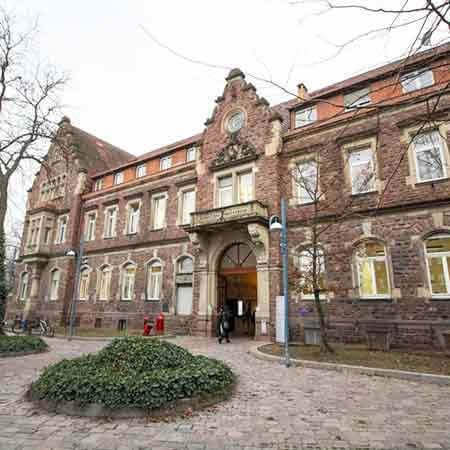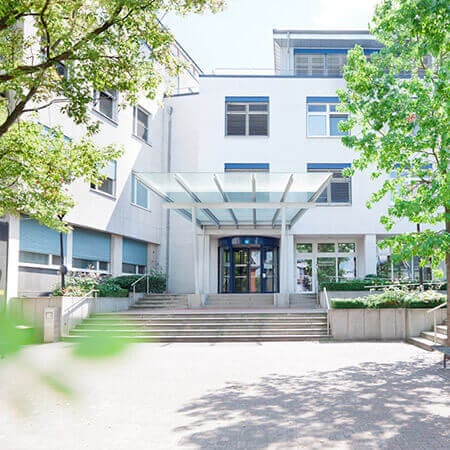Hip replacement in congenital hip dislocation (dysplasia)
Congenital hip dislocation is one of the most widespread congenital skeletal deformities. It is characterized by hypoplasia of all elements of the hip joint. This developmental defect has three degrees of severity which pass one into another:
- Unsustainable thigh
- Subluxation
- Hip dislocation
The Booking Health portal presents 80 German clinics specializing in Hip replacement in congenital hip dislocation (dysplasia)
Show all clinics
The cause of the pathology is a violation of intrauterine development as a result of hormonal imbalance, vitamin deficiency, toxicosis, or other complications during pregnancy. There is also a hereditary dysplasia of the hip joint.
Congenital hip dislocation remains undiagnosed very often. Up to 40% of all cases of the hip joint arthrosis are connected with the congenital developmental defects.
Congenital hip dislocation – Diagnostics
The following X-ray methods are used for diagnostics:
- Arthrography – radiography (image) of the hip joint
- Computed tomography with 3D modeling
Arthrography is mostly used for the primary diagnostics of the pathology. CT is a clarifying examination.
Best clinics for the сongenital hip dislocation diagnostics in Germany:
Congenital hip dislocation – Treatment (replacement)
There are many techniques for the congenital hip dislocation treatment, including the surgical ones. Replacement and various osteotomies are applied. In recent years, endoprosthetics of the hip joint has been increasingly used. It has the following advantages:
- Earlier joint function recovery
- Full restoration active limb movements (while the other methods of treatment may provide incomplete recovery of working capacity)
- Low risk of postoperative complications
During the operation, an artificial endoprosthesis is implanted. Sometimes this surgical intervention is combined with osteosynthesis, so that both lower limbs remain the same length.
The advantages of performing the endoprosthetics in Germany:
The state-of-art and high-quality endoprostheses are used in Germany. They can serve for decades without need in revision surgeries to replace the artificial joint. The functionality of such joints allows not only to walk without any difficulties and limitations, but also to go in for sports. Qualitative endoprostheses are made of materials with low reactogenicity, so they are not rejected by the body.
Low risk of complications. In Germany, endoprostheses are implanted through incisions of the minimum length – about 10 cm, while in other countries the size or incision can reach 25 cm. As a result, the risk of bleeding or infectious complications decreases, the postoperative wound is healed much faster.
Good postoperative period tolerance. The patient is provided with qualitative care and well-performed anesthesia. In Germany, many clinics use systems that allow the patient to inject the analgesics by himself, if needed.
Best clinics for hip replacement in Germany:


Congenital hip dislocation – Rehabilitation
The patient spends the early postoperative period in a hospital. Rehabilitation begins almost immediately. It lasts for 3-4 months. A qualitative rehabilitation program allows to reach the following results:
- To avoid complications
- To recover faster
- To restore completely the function of the operated limb or the spine
Rehabilitation is divided into the early and late one. The early rehabilitation lasts for 2 weeks. It is carried out in the hospital where the patient was operated. The epithelialization and healing of the wound occurs at this time.
The bone structures are healing during the next 3 months. During this period it is desirable to undergo a rehabilitation in the specialized clinic. It includes:
- Physiotherapeutic procedures and massage for blood circulation improvement and normalization of the muscle tone
- Improving muscular strength of the lower limbs
- Stabilization of posture and gait (they are often violated in people who used to adapt to their disease for a long time)
- Increasing the range of motion in the operated joint
In the course of rehabilitation a person develops the correct stereotypes of walking and other actions, like lifting from a sitting or lying position, moving along the stairs, etc. Such healthcare professionals as rehabilitation specialists, kinesiotherapists, and physiotherapists help patients in these affairs.
Best clinics for orthopedic rehabilitation in Germany:
Author:
The article was edited by medical expert, board certified Dr. Nadezhda Ivanisova. For the treatment of the conditions referred to in the article you must consult a doctor; the information in the article is not intended for self-medication!
Sources:
Articles for Orthopaedic Practice - Orthogate
The cost of services includes
Here you can find the cost of treatment for this disease at the German University Hospitals. Leave a request and we will provide a free consultation with a doctor and will start organizing the whole treatment process.
The program includes the following:
- Issuing of an invitation for getting a visa for treatment as quick as possible
- Fixing an appointment at a time convenient for you
- Preliminary organization of a comprehensive examination and discussion of the forthcoming treatment plan
- Arranging transfer from the airport to the hospital and back to the airport
- Provision of interpreting services and services of a personal medical coordinator
- If necessary, assistance in the organization of further surgical treatment
- Provision of a medical insurance against treatment complications covering up to 200,000 euro
- Preparation and translation of medical records and recommendations from the hospital
- Assistance in the subsequent communication with your attending physician, including consultations on repeated X-ray images through the unique medical document management system E-doc



